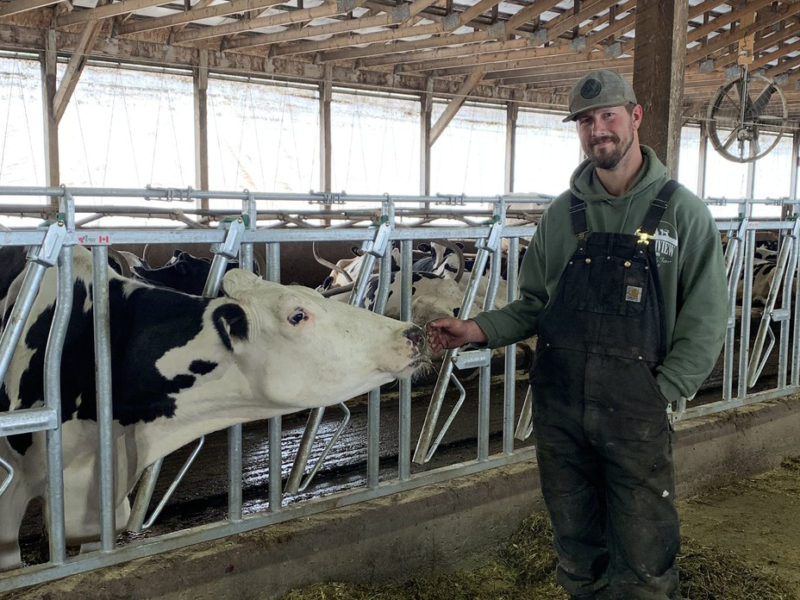VANCOUVER – A series of unfortunate events has resulted in a slight downturn for the conventional dairy sector.
On March 19, the BC Milk Marketing Board implemented a series of incentive days for dairy producers in March, April and May after fluid milk sales at grocery stores increased 40% as consumers rushed to stock up in the face of COVID-19.
But the board cancelled the incentive days for April and May on March 31 as demand for cream fell off due to the widespread closure of restaurants and coffee shops. Starbucks, for example, announced March 20 it was closing most of its restaurants in Canada for at least two weeks; they remained closed at press time.
“That demand at grocery stores quickly came backwards. Not all the way back but it came back significantly. And on top of that, the [foodservice] sector essentially shut down,” explains BC Dairy Association general manager Jeremy Dunn.
With BC cows continuing to produce as much milk as before COVID-19 – and wildly altered buying patterns and resulting supply chain issues presenting unique challenges for the sector – producers were told to begin disposing milk on April 3.
“We’re only in a situation where about 3% of the daily milk production (in BC) is being disposed of on farms,” Dunn says. “We know the supply chain is adjusting rapidly. We are hopeful this will be a short-term situation.”
Down the drain
Enderby dairy farmer Michael Haak produces 3,000 litres of milk each day and the directive resulted in four days of hard work going down the drain.
“I was asked by our milk board to dispose of 12,000 litres,” he says. “It’s incredibly hard seeing a product we work so hard to produce not make it into the hands of British Columbians.”
Prior to milk being dumped, an industry-wide partnership led by the BCMMB allowed 10,000 four-litre jugs (40,000 litres) of milk to be donated to Food Banks BC on April 7.
Vedder Transport hauled the milk to dairy processor Saputo, which processed it, and distribution partners Sysco Canada, Associated Grocers and Save-on-Foods made sure Food Banks BC received it.
“When we have those abilities to adjust and we have excess milk and we have excess processing capacity, we’ll work to get that milk into food banks,” Dunn explains. “The last thing a farmer wants to do is to have to dispose of the milk on his farm.”
Additionally, the BCDA and the Mainland Milk Producers Association collectively donated $175,000 to Food Banks BC to purchase food staples that are in short supply.
Dunn says supply chain issues may have resulted in slower delivery times but he has been very vocal about the fact that there is no shortage of milk, meaning buying limits in stores aren’t there because there isn’t enough milk being produced.
“We communicated to government, we communicated through the Dairy Farmers of Canada, the Retail Council of Canada, the Canadian Federation of Independent Grocers saying there’s lots of milk. Please take the signs down,” he said.
Most stores had taken down limits by Easter weekend as the supply chain began adjusting, resulting in an uptick in retail sales. As a result, the milk board rescinded the disposal order on April 14.
“There’s still an excess of cream, which has been repurposed for animal feed or into clean energy through an anaerobic digester,” notes Dunn.
COVID-19 has also resulted in staffing issues for at least one processor. Another on Vancouver Island had to switch from glass to cartons after stores’ refusal to take returns resulted in a shortage of the bottles, Dunn adds.
While conventional milk is tackling its issues, the organic milk sector is going strong.
The specialty product is more reliant on fluid milk sales so reduced foodservice demand has little had impact on sales. In fact, a 3% sleeve which allows producers to ship more milk without buying quota on March 31 continues, something Mara organic dairy farmer Quentin Bruns doesn’t think will last long.
“I kind of thought that during times of tight money that people would view organic milk as a luxury item and I thought we would be the ones to be hit,” he notes. ”I’m surprised by demand increase but not convinced it will stay strong over time.”
Dunn says the rapidly changing situation is being monitored closely across the world.
“It’s a national challenge; it’s an international challenge, really,” he says. “There’s milk being disposed of on farms in Wisconsin, throughout the United States and other countries in the world, including New Zealand. So this is not unique to British Columbia or even to Canada.”


 Island farmers renew request for local abattoir
Island farmers renew request for local abattoir